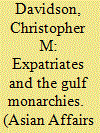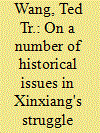| Srl | Item |
| 1 |
ID:
132345


|
|
|
|
|
| Publication |
2014.
|
| Summary/Abstract |
For many years huge expatriate populations have played a much documented role in the economic development of the Gulf monarchies. But a less well-told story is how expatriates have also contributed to their political stability. As non-citizens their presence in such large numbers has reinforced the elite status of most citizens in the region - an important non-pecuniary legitimacy resource for the various ruling dynasties. Moreover, the primarily employment-driven status of expatriates has meant that they have usually adopted either an apolitical or even prostatus quo stance. In some cases their perceived loyalty has led to selective naturalization or even direct co-option into security services. Disrupting this decades-old relationship, however, have been the recently changing political and economic circumstances of the Gulf monarchies. Already decisions have been made to reduce significantly expatriate populations due to accumulating pressures. Such measures are likely to threaten the historic political advantages the presence of expatriates has provided for these polities.
|
|
|
|
|
|
|
|
|
|
|
|
|
|
|
|
| 2 |
ID:
131641


|
|
|
|
|
| Publication |
2014.
|
| Summary/Abstract |
This article studies people born in rural China who now live in urban areas of China and possess a residence permit, an urban hukou; these are the hukou converters and they are examined using large datasets covering substantial parts of China in 2002. According to our estimates, there are 107 million hukou converters constituting 20% of the registered population of China's urban areas. Presence of a high employment rate in the city, that the city is small or medium-sized, and that the city is located in the middle or western part of China are factors which cause the ratio of hukou converters in the registered city population to be comparatively high. The probability of becoming a hukou converter is strongly linked to having parents with relatively high human and social capital and belonging to the ethnic majority. Compared to their rural-born peers left behind, as well as to migrants who have kept their rural hukou, the hukou converters have much higher per capita household incomes. Years of schooling and CPC membership contribute to this difference but most of the difference remains unexplained in a statistical sense, signalling large incentives to urbanise as well as to receive an urban hukou. While living a very different life from their peers left behind, the economic circumstances of China's hukou converters at the destination are, on average, similar to the urban-born population. Hukou converters who receive an urban hukou before age 25 do well in the labour market and we have reported indications that they actually overtake urban-born peers regarding earnings. In contrast, hukou migrants who receive an urban hukou after age 25 do not catch up with their urban-born counterparts in terms of earnings.
|
|
|
|
|
|
|
|
|
|
|
|
|
|
|
|
| 3 |
ID:
129264


|
|
|
|
|
| Publication |
2012.
|
| Summary/Abstract |
This is part of a supplementary address by Comrade Jiang Zemin at the Central Committee's Taiwan work meeting. For some time already, ethnic separatists in China's Xinjiang and outside its borders have been rampantly active and have brought serious harm to Xinjiang' stability and development. We must be highly alert and take strict precautions. Our leading cadres and especially high-placed cadres must inform themselves about both the historical and current circumstances of the so-called East Turkistan issue touted by Xinjiang's ethnic separatist forces. The Xinjiang region has since ancient times maintained close contacts with the motherland's Central Plains. From the Han dynasty up to the mid and late Qing dynasty, Xinjiang and its surrounding regions came under the general designation "western regions." In the second Shenjue year of Han Emperor Xuandi, or 60 by the Gregorian calendar, the western regions were officially incorporated into the motherland's territory. During the Sui and Tang dynasties, the central government continued to exercise administration over the western regions, and Tang Emperor Taizong substantially strengthened its jurisdiction over that vast region.
|
|
|
|
|
|
|
|
|
|
|
|
|
|
|
|